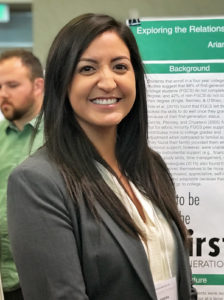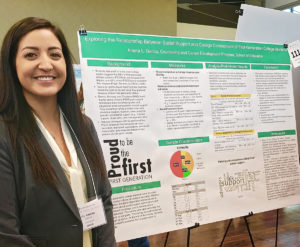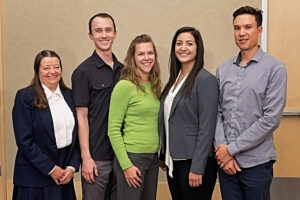 At the 2017 Colorado State University Graduate Student Showcase, School of Education student Ariana Garcia received the College of Health and Human Sciences’ Excellence in Research Scholarship Award for her poster, “Exploring the Relationship Between Social Support and College Commitment of First-Generation College Students.”
At the 2017 Colorado State University Graduate Student Showcase, School of Education student Ariana Garcia received the College of Health and Human Sciences’ Excellence in Research Scholarship Award for her poster, “Exploring the Relationship Between Social Support and College Commitment of First-Generation College Students.”
Garcia, in her second year of the Counseling and Career Development master’s degree specialization, credits her interest in studying the experiences of first-generation students to her participation in the McNair Achievement Program as an undergraduate. In the program, she noticed that others were first-generation college students and found herself comparing their experiences to her own.
“I noticed that my support was different from theirs,” she said. “I knew I wanted to research the impact of social support and the role it plays in the commitment to college in a first-generation college student.”
Laying groundwork for making a difference
Having earned her B.S. in sociology and social sciences, Garcia sought a master’s degree that would allow her to positively affect the college student experience.
“I thought I wanted to be a counselor, to help students – especially first-generation – with the issues they face in college.”
She discovered the CCD program at CSU, and knew it was the right fit for her aspirations.
“I loved that this program offers counseling and career counseling coursework and that courses in student affairs are available,” she said. “This allows me to have a background in counseling, as well as student affairs, which is unique in college counseling programs.”
While she appreciates the strength of the program’s coursework, Garcia said the fact that her internship could be outside the mental health field was the final selling point of the program.
“I want to continue researching and to impact systemic issues in higher education,” she explained, “so after graduation, I’m pursuing a doctorate rather than counseling licensure.”
Contrasting preliminary findings with previous research
 Although rooted in her experiences in the McNair program, Garcia’s internship is what inspired her research initiative. While interning with CSU’s Community for Excellence, Garcia worked directly with first-generation students who received financial awards through CSU’s First Generation Award scholarship. These students were required to meet with her throughout the academic year for checking in, mentoring, and discussion on how they were managing the transition to college.
Although rooted in her experiences in the McNair program, Garcia’s internship is what inspired her research initiative. While interning with CSU’s Community for Excellence, Garcia worked directly with first-generation students who received financial awards through CSU’s First Generation Award scholarship. These students were required to meet with her throughout the academic year for checking in, mentoring, and discussion on how they were managing the transition to college.
“I noticed that social support appeared to be a factor in how these students do in college,” said Garcia.
Wanting to discover how and why this support impacts first-generation students, Garcia opted for the master’s thesis option in the CCD program. She began a quantitative study on student adaptation to college.
Garcia recruited first-generation students for her preliminary sample from various offices that work with first-generation students, including on-campus cultural centers and C4E. Through her Student Adaptation to College questionnaire, Garcia gathered data on how committed the subjects were to college in general and their institution in particular. The survey also used the social provisions scale to determine social support and a general perception of how the student feels they are valued by others.
Garcia’s preliminary results, which appear to contradict the indications of previous literature, show that the students surveyed have high levels, overall, of social support and commitment to college.
“The research shows that while their families supply emotional support, first-generation students rely more on their advisers than on their families for learning instrumental skills that are helpful in college, such as study skills, time management, etc.,” said Garcia.
Impact through scholarship and education
 Intrigued by these preliminary results, Garcia said she is continuing her research with a larger sample size in order to examine the relationship between social support and commitment/institutional attachment in first-generation college students.
Intrigued by these preliminary results, Garcia said she is continuing her research with a larger sample size in order to examine the relationship between social support and commitment/institutional attachment in first-generation college students.
In the demographics section of the survey, students self-identified their race; respondents identified as Hispanic or Latinx, White, Asian, or multiple races. No respondents identified as Black or African-American.
“Black or African-American students, and Latinx students make up the largest number of the first-generation college student populations,” said Garcia. “My preliminary sample is representative of all years in college, but the lack of respondents who identify as Black or African-American was limiting. I’ve since connected with additional offices on campus that have allowed me to add more diverse students to the sample.”
Garcia plans to defend her master’s thesis and publish in time to graduate at the end of the Spring 2018 semester. She is currently applying to doctoral programs – primarily on the West Coast – that focus on education policy in higher education.
Now and in the future, Garcia hopes to present her research at conferences.
“I enjoyed presenting at the Grad Show,” she said. “Presenting drives me. I have experience presenting at conferences as an undergrad; I would love to present more.”
While continuing her research into the experiences of first-generation students is her primary initiative, Garcia said she hopes to impact students as an educator as well.
“I would like to be a faculty member at an institution,” she said. “As an undergrad, I never had a woman of color as my professor; I want to help drive change there.”
The School of Education is part of CSU’s College of Health and Human Sciences.